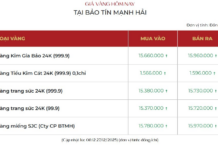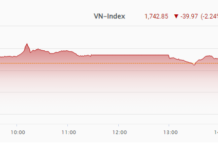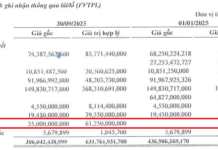**EVN Faces Over $44 Billion Deficit, Requires Austerity Measures**
Regarding the proposal to include the Vietnam Electricity (EVN) Group’s loss of over $44 billion in the average retail electricity price, which has received mixed reactions, at the seminar “Sustainable Development of the Electricity Industry – The Issues Arise,” Mr. Trinh Quoc Trung, Deputy Director of the Electricity Department (Ministry of Industry and Trade) emphasized that according to regulations on electricity prices, EVN’s reasonable and legitimate input costs will be included in the average retail electricity price for adjustment.
However, as we are just emerging from the Covid-19 pandemic, the economy and other sectors need stability to recover, so there were no price increases in 2022. In 2023, there were two minor adjustments.
“By the end of 2023, EVN will face a deficit of about $50 billion due to expenses, commonly referred to as accumulated losses,” he said. This does not include the $21.8 billion difference in electricity rates that EVN has to pay to power generation units according to power purchase agreements. In other words, due to the exchange rate fluctuation between the Vietnamese dong and foreign currencies, power generation units had to borrow capital from foreign credit institutions to invest in power sources, and EVN is responsible for settling these payments per the power purchase agreements.

Electricity sales prices are lower than production costs, resulting in a deficit of over $44 billion for EVN. Photo: Hoang Giam |
This situation has created a deficit, as EVN’s revenue is lower than its total electricity generation costs. Sooner or later, we must allow the enterprise to account for the true and full costs in the electricity price because EVN cannot bear the burden indefinitely, according to Mr. Trung.
The Deputy Director of the Electricity Department emphasized that EVN is a state-owned electricity production and trading enterprise but is regulated and monitored by state management agencies, not a monopoly. EVN has also tightened its belt in the last few years due to deficits.
Electricity is ‘Special,’ Not Subject to ‘Profits Kept, Losses Borne’ Like Other Commodities
According to Mr. Nguyen Tien Thoa, former Director of the Price Management Department (Ministry of Finance), we must decipher where this loss comes from and its causes. Without deciphering it, it will be difficult to gain social consensus. That is, people reflect that when there are profits, nothing is said, but when there are losses, they are passed on to the people…
With the amount of over $44 billion that EVN reported in accumulated losses, Mr. Thoa suggested not using the word “loss.” He explained that a simple understanding of loss in production and business is when total revenue is less than total cost. The reason is that the selling price is lower than the production cost.
Usually, commodities are traded in the market, and their prices are determined by market forces, so it is a matter of “profits kept, losses borne.” If a company performs poorly and has poor management, resulting in high production costs that the market does not accept, it must accept the loss. If EVN were just such a unit, we wouldn’t discuss it here, he analyzed.
However, electricity is not a typical commodity. Electricity serves multiple objectives and is adjusted according to economic and social developments.
It is clear that electricity prices are not market-determined but state-determined. Therefore, the government carefully considers the impact of electricity prices, how to adjust them, the degree of adjustment, and the reasons for the changes. The government makes detailed calculations to minimize the impact.

Mr. Nguyen Tien Thoa: It is suggested to implement the Prime Minister’s decision, manage the correct mechanism, calculation method, and adjustment time. Photo: Pham Hai |
In 2022-2023, for various objective reasons, we decided to set electricity prices lower than production costs by 135-149 VND/kWh. So, this is not a loss but a negative cash flow difference because we aim for a more significant cause for the country. The electricity industry must temporarily not consider the factors permitted by the Law on Electricity, which is to calculate accurately and fully into the price.
Mr. Thoa stated that even with consensus on handling EVN’s deficit of over $44 billion, the calculation must be reasonable.
In addition, EVN also needs to review all negative cash flow differences, keep the amounts allowed by law to be included in the price, and develop a reasonable allocation plan to avoid shocking electricity price increases.
Regarding electricity prices, expert Nguyen Tien Thoa suggested implementing the Prime Minister’s decision, managing the correct mechanism, calculation method, and adjustment time.
“We should adjust electricity prices every three months. If we adjust them annually, all costs will be compressed and then released at once, causing a tremendous impact,” he suggested, drawing on his experience in managing gasoline prices. “Now, with a market mechanism, if we keep buying high and selling low, no one can bear it. The state cannot compensate. The budget cannot afford it. There is no other way. I think we have to go down this path,” he added.
Tâm An








































